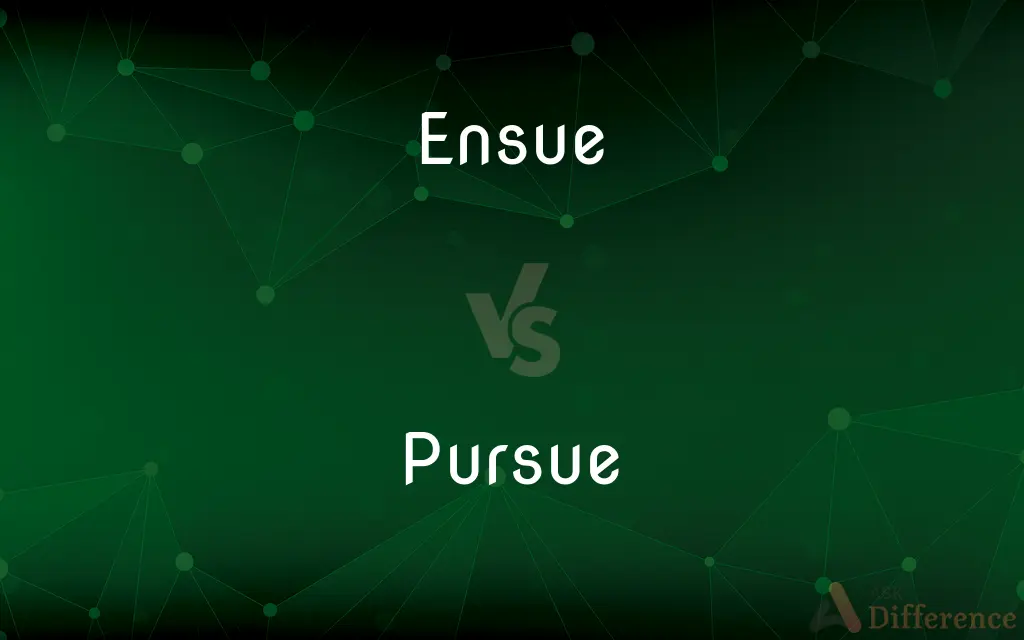Ensue vs. Pursue — What's the Difference?
Edited by Tayyaba Rehman — By Maham Liaqat — Updated on April 26, 2024
Ensue means to follow as a consequence or result of something, while pursue involves actively following or chasing something with the intent to catch or achieve it.

Difference Between Ensue and Pursue
Table of Contents
ADVERTISEMENT
Key Differences
Ensue typically refers to something that happens subsequently, usually as a natural or logical consequence of an action or event. For instance, chaos might ensue after a sudden policy change. Whereas, pursue is an action taken deliberately, often requiring effort or ambition, such as pursuing a degree or a career.
When actions ensue, they are often involuntary or unavoidable outcomes, like complications that ensue from a medical procedure. On the other hand, to pursue something implies a choice and a planned effort, such as pursuing a suspect in a police chase.
In literary or formal contexts, ensue might be used to describe events that unfold in a narrative following a climax. Conversely, pursue could describe a character’s prolonged effort to achieve a goal or resolve a conflict within the story.
Ensue is rarely used in active voice constructions and does not imply agency; the subject is typically the outcome itself. In contrast, pursue is frequently used in active constructions, emphasizing the agent or subject actively engaging in an activity.
The outcomes that ensue are generally direct and immediate, reflecting a cause-and-effect relationship. In contrast, the goals pursued may require sustained effort over time and are not guaranteed to be the direct result of initial actions.
ADVERTISEMENT
Comparison Chart
Definition
To happen as a result of something.
To follow or chase with the intent to catch or achieve.
Usage Context
Passive, describing natural outcomes or consequences.
Active, involving deliberate effort or ambition.
Agency
Implies no direct agency; outcomes follow naturally.
Involves active agency and intent.
Temporal Aspect
Immediate or direct consequence.
Often involves sustained effort over time.
Example in Sentence
After the announcement, confusion ensued.
She decided to pursue a career in medicine.
Compare with Definitions
Ensue
To follow as a sequence or result.
An awkward silence ensued after his remark.
Pursue
To strive towards a goal or objective.
She pursued excellence in every aspect of her work.
Ensue
To arise or emerge as a condition or state.
Chaos ensued from the unexpected power outage.
Pursue
To engage in an activity or course of action.
He continues to pursue his interest in photography.
Ensue
To occur according to natural progression.
As the debate continued, more issues ensued.
Pursue
To continue or proceed along a path.
The company decided to pursue a different marketing strategy.
Ensue
To happen subsequently.
A discussion ensued about the best course of action.
Pursue
To seek to attain or accomplish a purpose.
They pursued a resolution to the conflict.
Ensue
To occur as a result or consequence of something.
Violence ensued after the controversial verdict was announced.
Pursue
To follow or chase with the intent to capture or achieve.
The detective pursued the suspect across several states.
Ensue
Happen or occur afterwards or as a result
The difficulties which ensued from their commitment to Cuba
Pursue
Follow or chase (someone or something)
A heavily indebted businessman was being pursued by creditors
The officer pursued the van
Ensue
To take place afterward or as a result.
Pursue
Continue or proceed along (a path or route)
The road pursued a straight course over the scrubland
Ensue
To follow (a leader, inclination etc.).
Pursue
To follow in an effort to overtake or capture; chase
A fox that was pursued by hounds.
Ensue
To follow (in time), to be subsequent to.
Pursue
To strive to gain or accomplish
Pursue lofty political goals.
Ensue
(intransitive) To occur afterwards, as a result or effect.
Give three freshmen six bottles of wine, and hilarity will ensue.
Pursue
To proceed along the course of; follow
A ship that pursued the southern course.
Ensue
To follow; to pursue; to follow and overtake.
To ensue his example in doing the like mischief.
Pursue
To carry further; advance
Let's not pursue this argument.
Ensue
To follow or come afterward; to follow as a consequence or in chronological succession; to result; as, an ensuing conclusion or effect; the year ensuing was a cold one.
So spoke the Dame, but no applause ensued.
Damage to the mind or the body, or to both, ensues, unless the exciting cause be presently removed.
Pursue
To take action regarding (something), especially with the intention of sustained effort
A detective who pursued each lead.
Ensue
Issue or terminate (in a specified way, state, etc.); end;
Result in tragedy
Pursue
To engage in (a vocation or hobby, for example); practice.
Pursue
To try to have a romantic relationship with
A lady who was pursued by many suitors.
Pursue
To continue to torment or afflict; haunt
Was pursued by the demons of lust and greed.
Pursue
To follow in an effort to overtake or capture; chase.
Pursue
To take action regarding something or carry on an established activity or project.
Pursue
(ambitransitive) To follow urgently, originally with intent to capture or harm; to chase.
Pursue one's dreams
Pursue
(transitive) To follow, travel down (a particular way, course of action etc.).
Her rival pursued a quite different course.
Pursue
(transitive) To aim for, go after (a specified objective, situation etc.).
Pursue
(transitive) To participate in (an activity, business etc.); to practise, follow (a profession).
Pursue
(intransitive) To act as a legal prosecutor.
Pursue
To follow with a view to overtake; to follow eagerly, or with haste; to chase; as, to pursue a hare.
We happiness pursue; we fly from pain.
The happiness of men lies in purswing,Not in possessing.
Pursue
To seek; to use or adopt measures to obtain; as, to pursue a remedy at law.
The fame of ancient matrons you pursue.
Pursue
To proceed along, with a view to some and or object; to follow; to go in; as, Captain Cook pursued a new route; the administration pursued a wise course.
Pursue
To prosecute; to be engaged in; to continue.
Pursue
To follow as an example; to imitate.
Pursue
To follow with enmity; to persecute; to call to account.
The servant is not greater than his lord. If they have pursued me, they shall pursue you also.
Pursue
To go in pursuit; to follow.
The wicked flee when no man pursueth.
Men hotly pursued after the objects of their ambition.
Pursue
To go on; to proceed, especially in argument or discourse; to continue.
I have, pursues Carneades, wondered chemists should not consider.
Pursue
To follow a matter judicially, as a complaining party; to act as a prosecutor.
Pursue
Carry out or participate in an activity; be involved in;
She pursued many activities
They engaged in a discussion
Pursue
Follow in or as if in pursuit;
The police car pursued the suspected attacker
Her bad deed followed her and haunted her dreams all her life
Pursue
Go in search of or hunt for;
Pursue a hobby
Pursue
Carry further or advance;
Can you act on this matter soon?
Common Curiosities
Can ensue and pursue be used interchangeably?
No, they have different meanings and implications; ensue is passive and result-oriented, while pursue is active and goal-driven.
What is the key difference between ensue and pursue?
Ensue implies a result or consequence that follows naturally, without direct intent, while pursue involves deliberate action towards a specific goal or result.
Is pursue always related to positive goals?
Not necessarily; pursue can be used for any goal or objective, whether positive or negative.
What does it mean to pursue someone?
It generally means to follow or chase someone, often in order to catch them, as in law enforcement or a romantic context.
Can a conclusion ensue from an argument?
Yes, a conclusion can ensue from an argument if it arises naturally as a result of the discussion.
What does it mean when problems ensue?
It means problems arise as a natural or direct consequence of something that happened.
What does it mean to pursue an idea?
It means to explore or develop an idea actively, often with the goal of turning it into a reality.
Can pursue be used in a non-physical context?
Yes, pursue can be used in non-physical contexts, such as pursuing an idea, a career, or a course of action.
How do you use pursue in a sentence?
Pursue is used to describe actively seeking or striving for something, e.g., "She decided to pursue a master's degree."
Can ensue be used in a proactive context?
No, ensue is more appropriate for describing results that occur without proactive intent.
Can ensue be used to describe intentional actions?
Typically, no. Ensue describes outcomes that occur naturally from preceding events, not intentional actions.
How do outcomes that ensue differ from outcomes that are pursued?
Outcomes that ensue occur as natural consequences of other events, while outcomes that are pursued are the result of deliberate efforts.
Is it correct to say a plan is being pursued?
Yes, this implies that active steps are being taken to follow or implement the plan.
Does ensue have a positive or negative connotation?
Ensue is neutral; it can have positive, negative, or neutral connotations depending on the context.
What type of actions typically ensue from a decision?
Actions that naturally follow from the decision, often as direct or inevitable results.
Share Your Discovery

Previous Comparison
Slide vs. Slip
Next Comparison
Hindi vs. TamilAuthor Spotlight
Written by
Maham LiaqatEdited by
Tayyaba RehmanTayyaba Rehman is a distinguished writer, currently serving as a primary contributor to askdifference.com. As a researcher in semantics and etymology, Tayyaba's passion for the complexity of languages and their distinctions has found a perfect home on the platform. Tayyaba delves into the intricacies of language, distinguishing between commonly confused words and phrases, thereby providing clarity for readers worldwide.














































